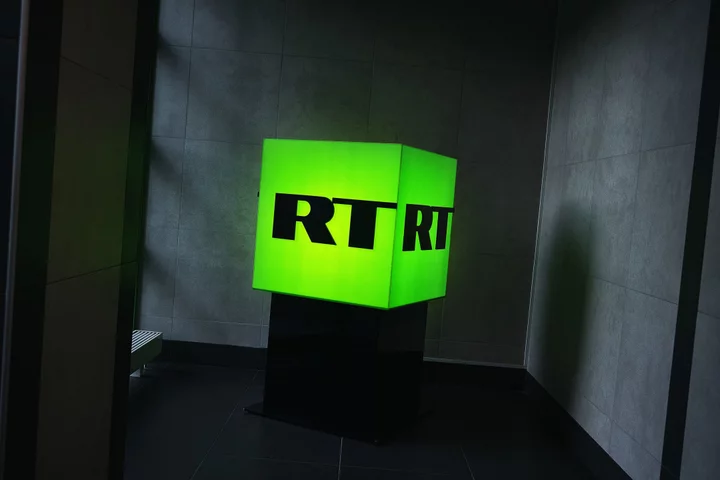The European Union promised to shut down the flow of Vladimir Putin’s propaganda after Russia invaded Ukraine, slapping sanctions on state-backed media RT and Sputnik days after the attack.
Nearly two years into the war, the Kremlin appears to have the last laugh. RT.com may be inaccessible in the EU, but a series of less popular mirror sites provides the same content, aimed at undermining the bloc’s support of Ukraine. One is swentr.site, or RT News in reverse.
“We spit on your sanctions,” RT Editor-in-Chief Margarita Simonyan said, in comments relayed by her press office.
Swentr was registered three days after the sanctions were announced by RT’s licensee, ANO TV Novosti, according to the WHOIS domain registration directory. It is one of at least 19 such sites that RT appears to use to reach audiences in the EU, according to the research group Reset.
Russian disinformation platforms have proven to be more flexible than EU attempts to rein them in, popping up under new names to provide links for its contributors and other blue-tick X users to push the Kremlin’s agenda, creating division in North Atlantic Treaty Organization members and fueling confusion over the war.
The EU’s sanctions process, on the other hand, generally moves slowly and has trouble focusing on a moving target. While the EU’s executive arm provides guidance and oversight, the task of enforcing sanctions is mostly the responsibility of member states, further complicating matters.
The European Commission is aware of the mirror sites and works with member states to effectively apply the sanctions, according to Vice President Vera Jourova, who is responsible for countering disinformation.
“I want to stress that despite some bypassing attempts, the sanctions are effective,” Jourova said. “No one can find those outlets by flipping through channels randomly. Online, news search engines and aggregators do not show results from those outlets.”
The measures have had some success in marginalizing Russia’s misinformation machine. Swentr received nearly 3 million hits in October, according to traffic counter Semrush. That’s a far cry from the 141 million RT.com got despite being blocked in multiple markets.
“State media sanctions have only partly reduced the Kremlin’s ability to spread disinformation in the EU,” Reset’s EU Director Felix Kartte said. “The Kremlin’s propaganda machine is quick to exploit loopholes in new regulations.”
Read More: EU Prepares Plan to Give Ukraine Lasting Security Commitments
Sputnik, which is subject to the same restrictions as RT, also operates through mirror sites such as sputnikglobe.com. While about a dozen Russian media outlets have been sanctioned by the EU throughout the war, RT and Sputnik have the most reach among international audiences and are the most active in trying to circumvent the measures, according to Reset.
Russia continues to use “regular massive disinformation operations in various countries to influence election outcomes and doubt election integrity, to polarize societies on certain issues,” said Baiba Braze, a Latvian diplomat who served as assistant secretary general for public diplomacy at NATO until June.
The EU sanctioned RT on March 2, 2022, banning its content and suspending broadcasts. The bloc said at the time Russia “has engaged in a systematic, international campaign of disinformation, information manipulation and distortion of facts in order to enhance its strategy of destabilization.”
In spite of the measures, which led to RT closing its offices in France and Germany, it has found various methods to work around them.
Read More: Putin’s War Economy Rebounds as Key Sectors Shrug Off Sanctions
Russian media personalities like sanctioned Simonyan maintain accounts on social networks, and RT content is shared in multiple languages on platforms including X, TikTok and Meta Platforms Inc.’s Facebook. The messaging app Telegram is another popular medium.
Taking down content requires constant vigilance. On Alphabet Inc.’s YouTube, which aggressively removes sanctioned media accounts, RT broadcasts are still regularly reposted in what experts describe as an endless game of whack-a-mole.
Others do less. The EU said in September that X was the biggest peddler of disinformation among major social networks and has urged owner Elon Musk to rein in disinformation.
“Tech companies’ efforts to limit the Kremlin’s information warfare have been patchy and half-hearted,” Reset’s Kartte said.
Read More: Russia Brings Its Food Security Misinformation to the G-20
Russia’s ideological flexibility is a major asset when attempting to spread disinformation. It often seeks to sow doubt rather than establish a set of facts, according to an October US State Department report on the Kremlin’s export of propaganda.
A common strategy is to exploit content in seemingly independent sources and then amplify via state-linked outlets and Russia’s network of official social media accounts. In October, an obscure Nigerian website falsely claimed Ukrainian First Lady Olena Zelenska went on a $1.1 million Cartier shopping spree in a post that went viral with the help of Russian channels.
Many of these feature Swentr links that pepper social media platforms including X, Reddit and Facebook. Articles on the mirror site are also shared by RT contributors, some with hundreds of thousands of followers.
“Russia’s war-fighting doctrine allocates significant attention to unconventional warfare,” Braze said. “Any Western country and political, business, cultural, NGO leader, journalist and influencer should be aware that Russia’s warfare doctrine involves interest in them.”
--With assistance from Daryna Krasnolutska.
Author: Alberto Nardelli, Jillian Deutsch and Stephanie Bodoni

